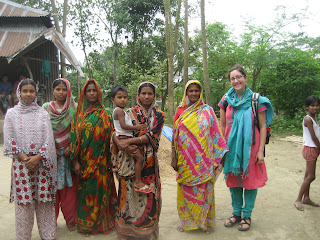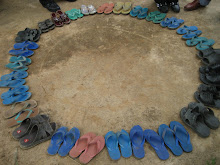Armed with the naive hope of hearing something real about Grameen, I went on another village visit today. The village was located in an area that is especially prone to flooding, so basically most of the village is under water for a significant amount of time each year. Set back by natural disasters, many villagers are unable to pay back their loans. This branch is considered pretty unsuccessful by the "higher authorities" at the GB head office, because their repayment rate is pretty low. We interviewed one such "flexible loan" borrower. Although it was interesting to talk to her, I didn't get a great answer to the one question that was most important to me. I asked her if there was a sense of shame or embarrassment associated with not being able to pay back a loan, and she told me that she just wanted to finish paying back her current loan so she could take out a bigger one. (Our translator then crafted a very special analogy comparing loan size to an episode of diarrhea. He said that when you have diarrhea you shouldn't immediately eat something that might upset your stomach, instead, you should take it easy for a while. He then applied this to the size of microcredit loans- gotta love bowel movement analogies). I think that one of the big problems with microcredit is that the recipients of loans are largely uneducated and almost always illiterate. Most borrowers have little business sense and no formal education (although they for sure have survival skills), and so their thought process is very primitive. This flexible loan borrower could only focus on repaying one loan so she could immediately take out another, which leads me to wonder whether or not it is a flaw in the Grameen system that she is allowed to take out another loan right away. Speaking of flaws in the Grameen system, we saw the borrowers do a very interesting and somewhat cult-like cheer for Grameen in the center meeting. "Grameen Bank, Grameen Bank, all hail Grameen Bank!"... accompanied by some gestures that are reminiscent of those of the Hitler youth, in my opinion.
However, we did get a somewhat straight answer (among the Grameen propaganda) to one question that I've asked a few different people- do borrowers take out loans from more than one MFI? Everyone that I've asked so far has said no. This is definitely against the "rules" of the grameen system because it gives borrowers the opportunity to pay back one loan with another loan. And so, instead of breaking the cycle of poverty, they are putting themselves in a new vicious cycle of taking out microloans- like paying your mastercard bill with your visa card. Today, the branch manager told us that yes, they do have cases where women overlap. Finally!! Although he did say that this only occurs with about 5% of the borrowers, and that when it does happen, there are basically no consequences. Additionally, they rely on community members to essentially tell on their friends who are borrowing from more than one MFI. Likely...?
Despite all of my criticisms of Grameen, I don't want to discount the success that Dr. Yunus and this organization has achieved. All inflated statistics and structural faults aside, the bottom line is that microcredit has allowed millions of people to enjoy lasting and permanent improvements in their quality of life. Many women have been empowered in different ways- I've talked borrowers who have said that since they started taking loans from Grameen bank they play an important decision-making role in their family. The most pressing question for me is, now what? These women are now able to meet the basic needs of themselves and their families, but they still have not achieved social equality. Now, the issue (for me) is, can microcredit further improve the social standing of women?




Happy Birthday Erica!
ReplyDeleteyou are amazing. keep up the good work.
ReplyDeleteHi Erica,
ReplyDeleteI came across your blog searching for grameen interns in google. I will be interning at Grameen Shakti in August in Dhaka, and would really appreciate any advice I could get prior to coming as the organization doesn't seem that helpful concerning the transitioning process. I am an American female too, and was wondering if you think the Prince hotel (vs a home stay) is good, health, food issues, or any advice you could possibly give me I'd really appreciate! My e-mail is a.patel12@lse.ac.uk.
Thanks and hope to hear from you!
Aneri